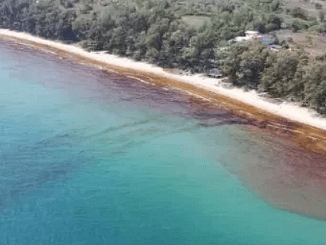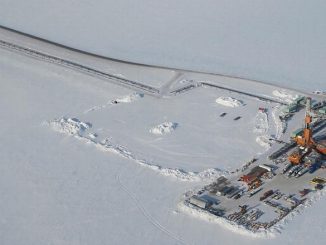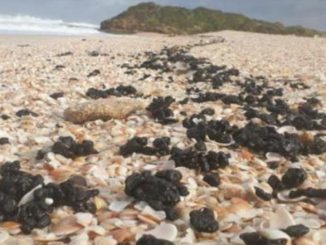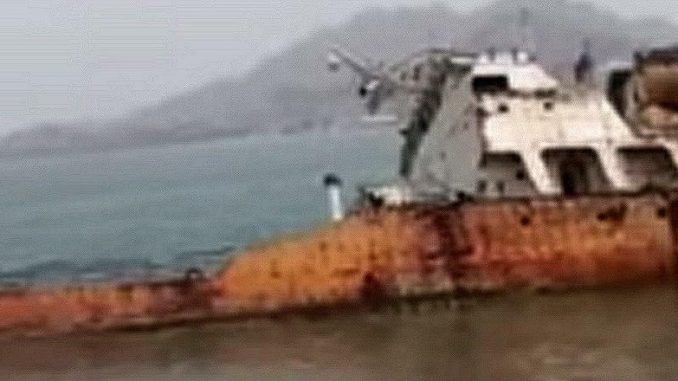
ADEN, Yemen, July 27, 2021 (ENS) – A long-abandoned oil tanker has sunk off the south coast of Yemen near the Port of Aden in the Gulf of Aden leaving an oil slick for 20 kilometers (12.5 miles) along the shore, says Mohammed Amzarba, CEO of the Aden Ports Administration.
Amzarba told the Yemen state media agency SABA Thursday that his team is having trouble refloating the sunken oil tanker Dia despite several attempts since last week when it sank off Yemen’s southern coast.
The Dia had been moored and abandoned since 2014 at Al-Bariqah, a dumping ground west of the main Port of Aden where a cluster of other dilapidated ships still remain. The tanker began to sink on July 18, officials said.
Yemen’s Public Authority for Environmental Protection last week issued a warning through SABA that spoke of a “catastrophe in the marine environment” as a result of the sinking of the Dia.
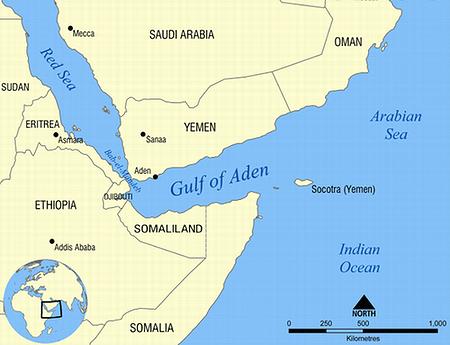
The Yemeni government convened an environmental rescue committee which reported that oil leaking from the Dia had reached a nearby nature reserve, causing dead fish to wash up on the shore. Ahmed Fahim, a member of the panel, blamed authorities for not undertaking precautionary maintenance of these derelict vessels as they are a threat to the marine environment.
Today the government’s preliminary assessment shows that the oil spill damage extends to a once vibrant nature reserve – the al-Housoua, or al-Huswah, Nature Reserve, on Yemen’s southern tip.
Before the Yemen Civil War, the al-Huswah Nature Reserve was visited by large swarms of migratory birds of some 150 different species, but more recently only about 50 species still visit the reserve, according to local officials.
They said the situation of this nature reserve had deteriorated even before the oil slick and it faces the risk of abandonment for lack of government support.
The number of visitors to the reserve had fallen off in recent months due to the destruction and negligence affecting many parts of the supposedly protected land.
“Many people avoid visiting this reserve because it is suffering and everything inside it turned to be not attractive,” Zakaria Mohsen, a local resident, told Saba.
Now oil from the Dia presents another degradation in the ability of the reserve to support wildlife.
Yemen’s Public Authority for Environmental Protection, PAEP, blames the sinking of the oil ship in Aden and “the continuous leakage of oil pipelines in Shabwa into the sea,” on the “aggression” of its opponents.
The PAEP statement asserts that “this disaster is a major environmental crime punishable by law and a flagrant violation of Environmental Protection Law No. (26) of 1995 and in violation of the provisions of international agreements on environmental protection signed by Yemen.”
Amzarba said the authorities are willing to make another effort to refloat the Dia and potentially avoid further damage.
And the sinking of the Dia is not the only menace to Yemen’s marine environment.
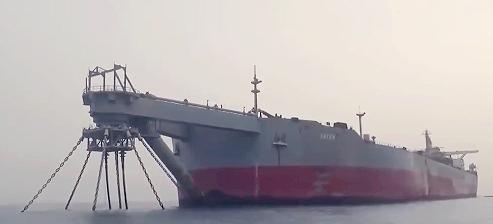
Moored off Yemen’s west coast, permanently anchored at the same location for more than 30 years without any dry-docking or shipyard repairs, is the SAFER, a Floating Storage and Offloading (FSO) oil vessel
Located about eight kilometers (4.8 nautical miles) southwest of the Ras Isa peninsula, the tanker is holding nearly 1.1 million barrels of oil – about four times as much oil as spilled from the Exxon Valdez into Prince William Sound, Alaska in 1989.
FSO SAFER has not undergone regular maintenance since the 2015 escalation of the conflict that has torn Yemen apart. SAFER’s structure, equipment and operating systems are deteriorating, warns the United Nations, “leaving the tanker at risk of leaking, exploding or catching fire.”
Greenpeace is working with organizations both in Yemen and the region to identify and support a solution to remove the oil while preparing to respond in case of a major oil spill.
“Given the political context of brutal conflict in Yemen, compounded by the COVID-19 pandemic, and with the risks of an oil spill threatening citizens in the wider region, UN action is critical to prevent an environmental and humanitarian disaster,” Greenpeace warned in June, calling on the international organization to make preventing an oil spill from the SAFER an “urgent priority in negotiations.”
Featured image: The abandoned, rusting hulk of the oil tanker Dia before she sank near the Port of Aden on July 18, 2021 (Photo courtesy Fleetmon)
© 2021, Environment News Service. All rights reserved. Content may be quoted only with proper attribution and a direct link to the original article. Full reproduction is prohibited.

